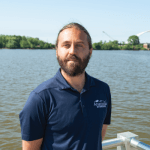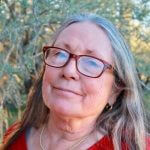Arthur Johnson
New Orleans, LA
Arthur advances initiatives around food security, the natural environment, and the built environment in the Lower Ninth Ward, one of the hardest-hit neighborhoods by storms, hurricanes, and flooding in the Gulf Coast region. Arthur is a founding member of the Mississippi River Gulf Outlet (MRGO) Coalition, member of the City Council of New Orleans Environmental Advisory Commission, member of the Louisiana Governor’s Task Force on Climate Change, member of the HBCU Community-Based Organization Gulf Coast Equity Consortium, and recipient of the Paul and Joyce Aicher Foundation Leadership-in-Democracy Award.
Arthur will be honored as a River Hero at River Rally 2022.
This interview was conducted by Carly Schmidt on February 17, 2022. Learn more about Arthur’s work at https://sustainthenine.org/.
How did your work in the Lower Ninth Ward begin?
Over a decade ago, one of the founders of the Lower 9 Center for Sustainable Engagement & Development (CSED) asked me for help with the organization. At that time, my background was in nonprofit administration and fundraising. I thought I would be working with them for maybe a few weeks. After the first week, the chairman of the board asked if I would be interested in running the organization on an interim basis. I agreed, and that interim position turned into more than a decade of my career. That time has brought into focus where we need to be as community-based organizations. Of course, the focus of CSED is the natural environment, health, and security. All those pieces linked together means a better quality of life, particularly for underserved communities; or, the term I am using now is overburdened communities. These are communities of color and communities that have elders. In most cases, these communities are built around the watershed. For example, the Mississippi River runs from Louisiana to Minnesota and you see key areas like Memphis and, of course, New Orleans and Baton Rouge. These are usually communities that are overburdened and underserved. It brings me joy to not only serve my community but also to share what we’ve learned in other communities along the Gulf Coast.
How has CSED’s programming shifted over the COVID-19 pandemic?
Early in 2020, we were gearing up for volunteers coming in from all over the country. People come to New Orleans for spring break and Mardi Gras, and we had a list of organizations and universities that wanted to work with us over that time. Then the pandemic hit and we had to put the brakes on. June is hurricane season and we knew that not even a pandemic would slow down hurricanes. We were concerned about how we would deal with a potential disaster. We decided that, first, we had to secure our supporters in order to help those people that need it in the community and also the young people in our education programs. We reached out to our constituents and said, “We don’t know how we can help but, if we can help, let us know.”
In 2021, we turned our facilities into vaccine distribution centers because we found that, even though vaccines were available, many of the elderly and people with disabilities in our community couldn’t wait in line for as long as they had to. We talked to the city and the health department and were able to open a vaccination center right in the Lower Ninth Ward. We pivoted into areas that would hopefully be beneficial, then went after whatever resources we could to make it happen. We are still staying true to our mission, realizing that the virus is spread through the environment. This work is a continuation of our goal of educating and advocating for a healthy environment.
What response did you see from funders when you pivoted away from strictly environmental work into responding directly to community needs?
The response was surprising. There were more opportunities for equity and inclusion funding than there had been in the past. We got some of it, not everything. These were more or less general funds and we were able to use them wherever needed as opposed to the funds being designated to a specific program.
But sometimes this funding didn’t pan out in reality. There were so many issues that needed to be addressed and only so much funding to go around. For example, relaxing certain bills was great, but we knew that the day of reckoning was coming. Also, the Lower Ninth Ward has one of the lowest unemployment support rates in the country – maybe $250 per week. We knew that these support programs weren’t going to last forever. Many people were facing homelessness, and then came Hurricane Ida. We became a distribution center when lights in Louisiana went out for almost a week. People were in need of materials and supplies to help them recover. We were able to extend that support through southeast Louisiana to help other overburdened communities as well.
It sounds like CSED provided baseline support on nearly every issue faced by these communities over the pandemic – from online school to support during and after Hurricane Ida. Where do you draw the line as an organization?
We try to stay in our lane, as you might say. But when there are situations like a pandemic, disaster flooding, and hurricanes, we can’t help but get into the game. It is our role as a community-based organization. We don’t stay in the game because that’s not who we are, but we do try to help. And, once we’re there, we try to create some understanding about what CSED does and our mission as it relates to the situation. Anything that impacts our community impacts our environment, and vice versa. We try to be resilient, adaptable, and collaborative because that’s the only way we can make a difference in a crisis.
Regarding our mission, we were able to start an environmental research internship in the summer of 2021 for high school students. We’re going to continue that program year-long and bring in a new component in the summer of 2022. We’re once again getting young people involved in citizen science and community science, looking at water and soil quality. These students are passing their learnings on to their families and siblings. That’s the kind of work that we’re continuing to do. Water is a key aspect in all of this because we need it to survive and, without it, we don’t have a high quality of life.
Looking back on your career, what moment or accomplishment jumps out as being the most impactful to you?
My most impactful moments usually involve young people. This research internship is not just STEM education, it’s teaching young people how to be scientists. Right now, we have all young Black men in the program. It humbled me because I know the challenges that Black men experience and I get to see them grasp new information and conceptualize it in new ways. To hear them saying that they want to do sports but be a scientist, too, is the most exciting component of my work because these youth are our future. Not only young Black men, but all young people in general. I often feel like my generation believes that they will be here forever but we will not. We need to relinquish back and work with younger generations.
And I’m sure these young men feel supported by you and CSED as well.
I want to give them more so they can continue the work. We will continue to work with them and their families. We provided some resources to help their families, as they were dealing with many local disasters. We told them that this program is not only about academia and research, it’s about quality of life. That means we look at every aspect of life and deal with issues that no one could foresee. We provided some financial support to their families and the interns were so appreciative of that and, to their parents, this support was unheard of. But this is how we do business so that we can put the pieces of our planet back together and change our mindsets.
What has kept you motivated over your career, especially in the last few years?
Whether it’s CSED or other places I’ve worked, I’ve always felt that if I can help one person or help them to change for the better, then I’ve made a difference. I believe that we’ve all been placed on this earth for a reason and we’re not here to acquire riches. We can’t take diamonds and gold with us when our time is up. I know that I am here to help people without judgment. That’s why this River Hero award is so important to me. It means that my peers recognize that I’m trying to do something for people and that’s worth more than gold. It means that maybe I am moving in the right direction of bringing in greater equity and growth into this environmental profession and also improving quality of life, because that’s the bigger picture.







